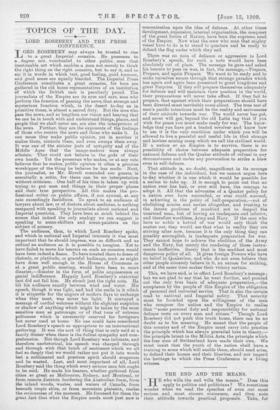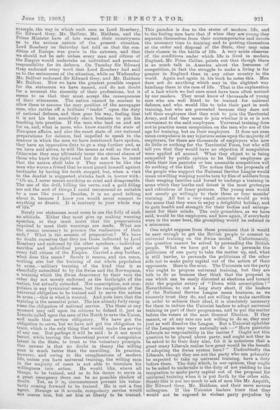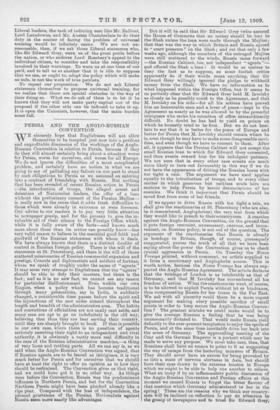THE END AND THE MEANS.
" HE who wills the end. wills the means." Does this apply to politics and politicians ? We sometimes wonder when we read the speeches of even our most serious and most sincere statesmen, and then note their attitude towards practical proposals. Take, for example, the way in which such men as Lord Rosebery, ,Sir Edward Grey, Mr. Balfour, Mr. Haldane, and the Prime Minister have of late warned their countrymen as to the serious nature of the present situation. Lord Roaebery 'on Saturday last told us that the con- dition of Europe was grave in the extreme, and that we should not be safe unless every man and citizen of the Empire would undertake an individual and personal responsibility for its defence. On Tuesday Sir Edward Grey endorsed every word that Lord Rosebery had said as to the seriousness of the situation, while on Wednesday Mr. Balfour endorsed Sir Edward Grey, and Mr. Haldane Mr. Balfour. Now we have the greatest possible respect for the statesmen we have named, and do not doubt for a moment the sincerity of their professions, but it seems to us that they must accept the consequences of their utterances. The nation cannot be content to allow them to assume the easy position of the newspaper man, who rattles off a brilliant " leader " upon the duty of national defence, and then goes his way, feeling that it is not his but somebody else's business, to put his teaching into practice. If the men who lead us and act for us, and, what is more, who know, exactly the state of European affairs, and also the exact state of our national preparations for defence, feel impelled to speak in the manner in which the men we have mentioned have spoken, they have an imperative duty to go a step further and, as we have said above, to will the means as well as the end. Otherwise they may ultimately incur the eternal shame of those who know the right road but do not dare to insist that the nation shall take it They cannot be like the man who warns a friend that he must guard himself against toothache by having his tooth stopped, but, when a visit to the dentist is suggested, shrinks, back in horror with : "Oh no, I never meant anything so cruel and disagreeable. The use of the drill, killing the nerve, and a gold filling are not the sort of things I could recommend as suitable to a case like yours. Besides, it is no good talking about it, because I know you would never consent to anything so drastic. It is contrary to your whole way of life."
Surely our statesmen must come to see the folly of such an attitude. Either they must give up making warning speeches, or they must insist that the preparations required to meet their warnings are made. What are the Means necessary to procure the realisation of their ends ? What is the essence of preparation ? We have no doubt ourselves that they are those indicated by Lord Rosebery and endorsed by the other speakers,—individual sacrifice and individual preparation on the part of every full citizen of the Empire. Carried a step further, what does this mean? Surely it means, and can mean, nothing else but the training of our whole population to arms, — military training of the kind that is so cheerfully submitted to by the Swiss and the Norwegians, training which the Swiss democracy by their vote the other day not merely endorsed as the birthright of the nation, but actually extended. Not conscription, not com- pulsion in any tyrannical sense, but the recognition of the liniversal obligation to be trained and to serve the nation in arms ;—this is what is wanted. And note here that the training is the essential point. The law already fully recog- nises the obligation of national service. The State at any moment may call upon its citizens to defend it, just as Lincoln called upon the men of the North to save the Union, and made that, service obligatory. We have got the obligation to serve, but we have not got the obligation to train, which is the only thing that would make the service of any use. But perhaps it will be said : Is it not much better, while leaving the theoretical power of compulsion latent in the State, to trust to the voluntary principle. Our answer is that no doubt in theory the willing man is much better than the unwilling. In practice, however, and owing to the complications of modern life, unless you have universal training, the willing man in the majority of cases is not able to translate his willingness into action. He would like, above all things, to be trained, and as to his desire to serve in a great emergency there can be no possible shadow of doubt. Yet, as it is, circumstances prevent his volun- tarily coining forward to be trained. He is not a free agent. Strange as it sounds, compulsory service would not mane him, but set him at liberty to be trained. This paradox is due to the stress of modern life, and to the feeling men have that if when they are young they separate themselves from their contemporaries and devote the necessary time to training and to putting themselves at the order and disposal of the State, they may miss their chance in the battle of life. A very acute observer of the conditions under which life is lived in modern England, Mr. Price Collier, points out that though there is so much talk in America about the keenness of competition, in fact the struggle to make a living is far greater in England than in any other country in the world. Again and again in his book he notes this. Men dare not do anything which may in the slightest way handicap them in the race of life. That is the explanation of a fact which we feel sure must have been often noticed by our readers. They must know of thousands of young men who are well fitted to be trained for national defence, and who would like to take their part in such training, but who are prevented because they dare not tell their employers that they wish to join the Territorial Army, and that they mean to join whether it is or is not convenient to the said employers. Universal training does not in practice mean compulsion on the men who are of the ago for training, but on their employers. It does not even mean compulsion in any injurious sense upon the majority of employers, for there are thousands of employers who now do little or nothing for the Territorial Force, but who will tell you that they would have no objection if compulsion were applied all around. What they object to is being compelled by public opinion to let their employees go while their less patriotic or less amenable competitors will do nothing of the kind. The notion that the proposals of the people who support the National Service League would mean unwilling weeping youths torn by files of soldiers from their weeping families and forced to undergo a training in arms which they loathe and detest is the most grotesque and ridiculous of fancy pictures. The young men would not merely go willingly to their three or four months' training. All but a very small .minority would go with the sense that they were to enjoy a delightful holiday, and to gain health and strength for their bodies and enlarge- ment for their minds. The only grumblers, as we have said, would be the employers, and here again, if everybody were in the same boat, the grumbling would be reduced to a minimum.
One might suppose from these premisses that it would be easy enough to get the British people to consent to universal training on the Swiss model. Unfortunately, the question cannot be solved by persuading the British people. What we have got to do 13 to persuade the politicians of one party to take the matter up, and, what is still harder, to persuade the politicians of the other side not to make party capital out of the action of their opponents. Here is the crux. The Unionists are the party who ought to propose universal training, but they are loth to do so because they think that the proposal is one which can be easily distorted at elections and turned into the popular outcry of "Down with conscription ! " Nevertheless, to cut a long story short, if the leaders of the National Service League mean business, as we sincerely trust they do, and are willing to make sacrifices in order to achieve their ideal, it is absolutely necessary for them to induce the Unionist leaders to adopt universal training as part of their programme, and to put the matter before the voters at the next General Election. If they cannot, or at any rate are not willing to do so, they may just as well dissolve the League. But a Unionist upholder of the League may very naturally ask :—" Have patriotic Liberals no responsibility, in the matter ? Ought not this question to be placed above party, and ought not they to be asked to do their duty also, for it is notorious that a great many Liberals realise how great would be the benefit of adopting the Swiss system here ? " Undoubtedly the Liberals, though they are not the party who can primarily be expected to take up universal training, have a duty before them. The duty which, in our opinion, they ought to be asked to undertake is the duty of not yielding to the temptation to make party capital out of the proposal for universal training when it is put forth by the other side. Surely this is not too much to ask of men like Mr. Asquith, Sir Edward Grey, Mr. Haldane, and their more serious colleagues. If the Unionist leaders knew that they would not be exposed to violent party prejudice by Liberal leaders, the task of inducing men like Mr. Balfour, Lord Lansdowne, and Mr. Austen Chamberlain to do their duty in the matter of facing the problem of universal training would be infinitely easier. We are not un- reasonable, then, if we ask those Liberal statesmen who, like Sir Edward Grey, warn us of the great perils before the nation, or who endorse Lord Rosebery's appeal to the individual citizen, to consider and take the responsibility involved in their warnings. To warn us at one time of our peril, and to tell us at another that it is idle to suppose that we can, or ought to, adopt the policy which will make us safe, is not the work of true patriots.
To repeat our proposition. We do not ask Liberal statesmen themselves to propose universal training, for we realise that there are special obstacles in the way of their doing so. What we do ask of them is to let it be known that they will not make party capital out of the proposal if the other side can be induced to take it up. It is upon the Unionists, however, that the main burden inust fall.












































 Previous page
Previous page